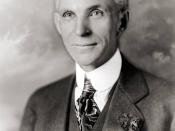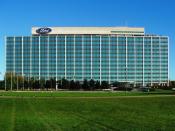Ford Motor Company
Ford Motor Company is the third largest automobile manufacturer in the world based on automobiles sold. Ford manufactures and distributes automobiles in 200 markets across six continents (Datamonitor 4). Ford's brands include Ford, Jaguar, Lincoln, Mercury, Volvo, Land Rover, Aston Martin, and Mazda. Ford's key products include passenger cars, trucks, busses and vans, sport utility vehicles, vehicle accessories, after-sales vehicle parts and products and extended repair service products. According to Fortune Magazine in 2007 Ford was the seventh ranked American-based company listed on the fortune 500 list, which was based on Ford's global revenues in 2006 of 160.1 billion. The company's success comes from its ability to focus on customer satisfaction and loyalty, anticipating and meeting changing customer needs, and delivering innovative products that exceed quality standards and are price friendly and also environmentally friendly.
The financial stability of Ford and the long-term stability of our world are met by Ford's strategy to lead with its products.
Several key strategies are used by Ford that help to develop products that are of high quality, affordable to consumers and that are in high demand. These strategies include; continuous improvement of quality standards and customer satisfaction, adjusting to consumer demands by developing state-of-the-art technology that is cleaner and more fuel efficient, and delivering customer-focused innovations faster. If these strategies are implemented correctly Ford can overcome many or the driving forces that control competition in the automobile industry.
Driving Forces
Driving forces in an industry are the major causes that change the industry and the competitive condition of that industry. The main driving forces that significantly alter the automobile industry include; competition and globalization, new technology and innovations, changes in cost and efficiency, regulatory influences and government policy changes, and changes in societal concerns, attitudes, and lifestyles.
Globalization is when...


